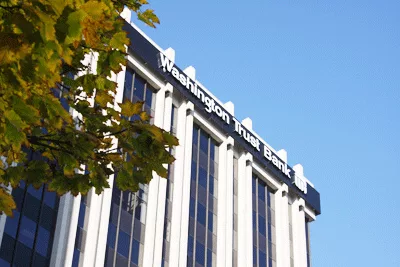WTB leads in market share again
Sterling tumbles to third in annual FDIC report; deposits slide 15 percent

After a two-year absence, Washington Trust Bank has moved back into its customary position as the leader in bank deposits in Spokane County, says an annual market share report released earlier this month by the Federal Deposit Insurance Corp.
The Spokane-based institution's $1.8 billion in local deposits as of June 30 equated to a 29.2 percent market share, up from a 23.9 percent market share a year earlier and far ahead of second-place Bank of America, which was listed at a 12.7 percent market share with about $781 million in deposits here. That big Charlotte, N.C.-based bank, nevertheless, also showed noteworthy gains here, rising from a 9.99 percent market share and $730 million in local deposits last year.
Spokane-based Sterling Savings Bank had moved ahead of Washington Trust in the 2008 FDIC deposit market share report and held that top spot again last year, but was forced to make sweeping changes to dig out from a deep financial hole, and tumbled to third place in the latest report. It held an 11.7 percent market share, based on $721 million in local deposits, down from a 27 percent market share and $1.97 billion in local deposits a year earlier.
Executives from Washington Trust couldn't be reached for comment.
Sterling's sharp drop stemmed entirely from an intentional reduction of its brokered deposits, which fell 70 percent from $1.52 billion on June 30, 2009, to $460.7 million on June 30, a bank spokeswoman says. Brokered deposits are deposits placed by brokers rather than conventional depositors, and have come under heavy scrutiny from regulators during the nation's financial-industry woes.
Sterling noted in its second-quarter earnings release that its retail deposits, which make up the bulk of its overall deposits, rose 2 percent in that quarter and were up 1 percent on June 30 from a year earlier. It said also that its number of total transaction accounts were up 4 percent from the year-earlier quarter.
Sterling recently completed a $730 million recapitalization effort and announced that the Federal Deposit Insurance Corp. had terminated a cease-and-desist order issued a year ago that required it to take a number of corrective actions to improve its stability.
In a general statement it issued in response to questions relating to this story, it said, "With the regulatory order lifted and our recapitalization complete, Sterling maintains a strong liquidity position, and our ratios now exceed regulatory requirements. We are privileged to continue serving our customers as the leading community bank in the Pacific Northwest."
The FDIC report, which measures banks' deposits by county and metropolitan statistical area on June 30 of each year, showed that the 17 FDIC-insured institutions operating here had total local deposits of $6.17 billion on that date this year, down 15.5 percent from $7.30 billion in deposits spread among 18 institutions a year earlier. That was down from a modest 2.4 percent rise in deposits the prior year. Gone from the list was Everett-based Coastal Community Bank, which apparently closed a branch it had been operating here since around the beginning of 2008. The bank's CEO couldn't be reached for comment or to confirm when that branch closed and why.
Eleven of the 17 banks on the list showed increases in local deposits over the prior year. None, though, increased their market share dramatically. Other than Washington Trust and Bank of America, the only institution to climb a spot on the list was U.S. Bank, which moved ahead of JPMorgan Chase into fourth place, with $617 million in local deposits and a 10 percent market share, up from a 7.4 percent market share a year earlier. Chase, which in the first half of last year was busy rebranding former Washington Mutual Bank branches, slipped to fifth place, as its local deposits fell to $496.1 million from $578.7 million a year earlier. Its market share nevertheless increased slightly—to 8 percent from 7.92 percent in 2009—as a result of the overall decline in bank deposits here.
The 12 other FDIC-insured institutions operating here all remained in the same ranking order as in 2009. Walla Walla-based Banner Bank was in the sixth spot, with a 7.5 percent market share, followed in the seventh through 10th spots by Wells Fargo Bank, at 7 percent; Inland Northwest Bank, 4.4 percent; AmericanWest Bank, 2.2 percent; and RiverBank, 2.1 percent. Rounding out the institutions serving the Spokane metropolitan area were the Bank of Fairfield, State Bank Northwest, Wheatland Bank, Panhandle State Bank, Bank of Whitman, Mountain West Bank, and the Armed Forces Bank.
Except for RiverBank, which is a boutique financial services provider, all of the FDIC-insured institutions operating here have deposits outside of the Spokane metropolitan area, the list shows, and in some of those cases those deposits dwarf what they manage here. That's particularly true, of course, for the big institutions such as Bank of America, Wells Fargo, JPMorgan Chase, and U.S. Bank, all of which have overall deposits in the hundreds of billions of dollars.
Sterling topped the list of banks based in Eastern Washington or North Idaho in that category, with deposits of $6.1 billion outside of the Spokane market, followed by; Banner, at $3.3 billion; Washington Trust, at $1.5 billion; and AmericanWest, at $1.3 billion. Next in order were Coeur d'Alene-based Mountain West Bank, at $818.3 million; Sandpoint-based Panhandle State Bank, at $770.7 million; Colfax-based Bank of Whitman, at $587.5 million; and Spokane-based Wheatland Bank, at $161.6 million.
Washington Trust long had been the leader here in bank deposits, but in 2008 was overtaken by Sterling, which had been increasing its market share steadily over the prior six years. Sterling's parent, Sterling Financial Corp., got entangled, though, in the financial market downturn, began reporting sizable losses, and Sterling Savings Bank was placed under the FDIC cease-and-desist order that required it to revamp its management, recapitalize, and meet a number of other conditions.
Related Articles

_c.webp?t=1763626051)
_web.webp?t=1764835652)

